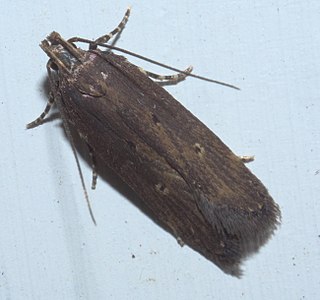
Chionodes is a genus of moths of the family Gelechiidae. It is distributed throughout much of the world. The larvae of many species use the Douglas fir as a host plant.
Chionodes petalumensis is a species of moth in the family Gelechiidae. It is found in North America from southern British Columbia to California, Arizona and Colorado.
Chionodes continuella is a moth of the family Gelechiidae. It is found from most of Europe, east to Japan. It is also present in most of North America.

Chionodes mediofuscella, the black-smudged chionodes moth, is a moth of the family Gelechiidae. It is found in North America, where it has been recorded from Nova Scotia to Florida and from British Columbia to Colorado, Arizona and northern California.
Chionodes acrina is a moth in the family Gelechiidae. It is found in North America, where it has been recorded from Washington to California.

Chionodes discoocellella, the eyeringed chionodes moth, is a moth in the family Gelechiidae. It is found in the United States, where it has been recorded from Maine to South Dakota, Florida, Texas and Colorado.
Chionodes fructuaria is a moth in the family Gelechiidae. It is found in North America, where it has been recorded from Alberta, California, Arizona, Wyoming, Utah, Idaho, Colorado, Nevada, New Mexico, Texas and Florida.

Chionodes fuscomaculella is a moth in the family Gelechiidae. It is found in North America, where it has been recorded from Nova Scotia and Quebec to Florida, south-western Wisconsin, eastern Texas and eastern Oklahoma.
Chionodes grandis is a moth in the family Gelechiidae. It is found in North America, where it has been recorded from southern Manitoba and southern British Columbia to California and New Mexico.
Chionodes iridescens is a moth in the family Gelechiidae. It is found in North America, where it has been recorded from southern Yukon to Washington, the Northwest Territories and to Nova Scotia.
Chionodes kincaidella is a moth in the family Gelechiidae. It is found in North America, where it has been recorded from south-western Alberta to Texas, New Mexico and California.

Chionodes obscurusella, the boxelder leafworm moth, is a moth in the family Gelechiidae. It is found in North America, where it has been recorded from Nova Scotia to Manitoba, south to North Carolina and Oklahoma.
Chionodes psiloptera is a moth in the family Gelechiidae first described by William Barnes and August Busck in 1920. It is found in North America, where it has been recorded from Quebec to British Columbia and then to Alaska, eastern Washington, Montana and New York.
Chionodes johnstoni is a moth in the family Gelechiidae. It is found in North America, where it has been recorded from California. The Global Lepidoptera Names Index has it as a synonym of Chionodes gilvomaculella.
Chionodes hodgesorum is a moth in the family Gelechiidae. It is found in North America, where it has been recorded from the gypsum dunes at White Sands National Park in New Mexico.
Chionodes scotodes is a moth in the family Gelechiidae. It is found in Sonora, Mexico.
Chionodes pinax is a moth in the family Gelechiidae. It is found in North America, where it has been recorded from southern British Columbia, Montana and Arizona.
Chionodes chlorocephala is a moth in the family Gelechiidae. It is found in North America, where it has been recorded from New Mexico, California and Mexico.
Chionodes sagayica is a moth in the family Gelechiidae. It is found in Russia. The Global Lepidoptera Names Index has this species as a synonym of Chionodes fumatella.
Ronald William Hodges, known as Ron, was an American entomologist and lepidopterist.





